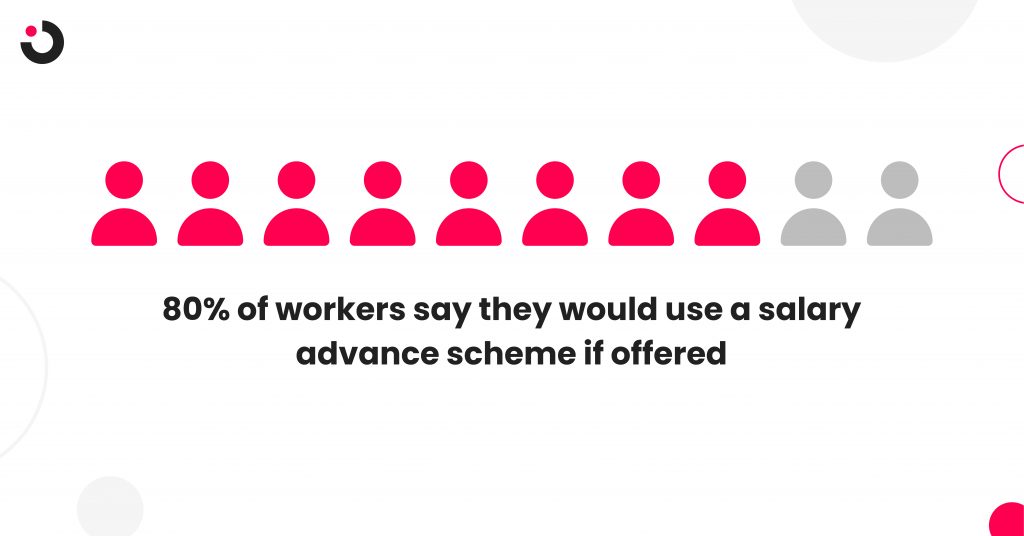
Salary advances: How the latest employee perk is taking the world by storm
Recruiting the right person is challenging. If you want to secure the best talent, you need to be competitive and stand out from the crowd. A good salary isn’t enough. Gen Z is looking for perks at work too, and salary advances are leading a global movement.
Flexible pay is becoming a global movement
Salary advances have proven extremely popular among employees. Outside of the UK, companies have been offering employee financial wellbeing benefits to their employees.
These have been particularly popular across Europe and in the US. These benefits include giving employees the ability to access their pay before payday (known as earned wage access, salary advances, earnings on demand, early pay access, or pay on demand).
Giving employees instant access to their earnings is win-win
It’s a useful tool in recruitment too, since it’s a benefit that would be attractive to the vast majority of candidates. Even more encouraging is that offering salary advances has been linked to an increase in productivity, a reduction in turnover, and a reduction in absenteeism.

Before we take a look at just how this perk has taken off around the world, let’s talk about the need for salary advances and why it is a win-win for you and your employees.
What is a salary advance?
A salary advance is simply the employee accessing the pay they’ve already earned but just haven’t been paid it yet.
Rather than employees having to struggle with money, feeling stressed and anxious, employees can access their pay on their schedule. It’s not a loan or any form of credit.
Salary advances can promote financial wellbeing
Some of the most forward-thinking businesses offer their employees salary advances. It’s a benefit focused on offering financial support to employees and ensuring that they feel valued and cared for.
The result is that employees are less worried about money meaning they can focus more on their work and being productive.
How does a salary advance work?
The norm right now is that employees follow a regular pay cycle and, more often than not, are paid once a month. The problem arises when you consider the cliched phrase “There’s too much month left at the end of the money”.
In fact, research shows that 37% of employees face financial hardship every month and struggle to make their wages last until their next payday.
Employees are craving flexibility at work more than ever
Salary advances do away with this issue and is one of the most appreciated perks at work. In fact, a research report by Ernst Young found that 80% of employees indicated they would use a form of early pay access if offered.
If they have worked two weeks, then they have already banked two weeks’ pay but traditionally can’t access it.
A salary advance changes this and employees can withdraw some of their pay when they need it. This might be for an emergency or an unexpected bill.
The payday loan trap
Payday loans exist because monthly pay cycles just don’t work.
Yes, monthly pay cycles offer benefits to organisations in terms of managing payroll efficiently. But when it comes to employees themselves, monthly pay is outdated and ineffective.
Building up a savings pot for when emergencies arise can be tough. Many employees are also struggling with day to day bills right now. So when the boiler breaks down or the car needs fixing on top of this, then the situation becomes financially unbearable.
Payday loans can bring misery and make financial issues worse
When a financial setback happens, where do your employees turn? They search for payday loan companies.
Your employees are charged exorbitant interest rates that they stomach initially to bring temporary relief for meeting their financial needs. But what does next month bring?
Invariably, your employees enter that vicious cycle whereby they need another payday loan to pay off the first. Of course, the following month they have their usual expenses. However, this time they have the loan repayment to make, plus the excessive interest and so find themselves in an even worse situation.
Why is employee financial wellbeing important to employers?
When your employees are struggling financially, their productivity levels drop as does their attendance at work. By considering employee financial wellbeing benefits for your organisation, you can demonstrate that you are a caring employer.
Importantly, you can reap the rewards brought by the boost in productivity when employees aren’t distracted by money worries.
This has a knock-on effect in terms of retention. Happy employees that feel supported are far more likely to remain for the long term.
Who leads the way with salary advances?
It may not come as a great surprise, but at present, companies in the US are at the forefront of early pay access. What these companies realise is that they stand to benefit by caring for their employees’ financial wellbeing.
Looking across Europe, businesses in Spain have also been early adopters of this. Early pay providers have tapped into Barcelona-based fintech companies to be able to support their employees.
While the US and our European neighbours have embraced salary advance schemes, the UK is now very much following closely behind.
This is the ideal opportunity for organisations to be at the forefront of a payment revolution with next to zero effort on their part. It’s a chance to shine in the eyes of your employees too.
Early access to pay is one of the hottest new employee benefits around. Plus it helps you position yourself as the go-to employer when it comes to employee benefits packages.
Benefits of a salary advance
Progression isn’t always what people hope for. This is certainly the case with how employees are paid.
In the past, many of us were paid weekly while these days the majority of us are paid monthly. The shift was driven by employers who were seeking cost savings and a way to streamline their payment processes. This appeared to be a step forward. But the damage this has caused to employees’ finances and their financial wellbeing has only been realised more recently.
Some employers are content in the knowledge that they pay their employees a decent wage. For them, how their employees manage their personal finances is up to them. However, the companies who attract and retain the best talent know that there is more to it than this.
Financial wellbeing benefits promote productivity and help attract talent
Potential and existing employees place real value on financial wellbeing benefits. The truth though is that many companies are failing to deliver.
A recent survey revealed that 47% of businesses offered no financial education nor planned to do so. Of the 20% that did, only 14% believe that what is in place is substantial and worthwhile.
When you consider the impact on employees it makes sense for businesses to correct this.
A CIPD research report shows that where companies have an effective financial wellbeing strategy in place, 30% see a marked increase in productivity and 24% can attract talent much more easily.
Bring your A-game
With Openwage, you can offer exactly what your employees are seeking: access to their pay without having to wait for payday.
By making employees wait until the end of the pay cycle, companies are inadvertently pushing their employees towards taking out high-cost credit when they need extra funds.
Every business is driven by its people and people should always be viewed as the most valuable asset. So it makes sense to offer greater flexibility in how employees are paid to keep your workforce satisfied.
Now is the ideal time for businesses to demonstrate that they are at the forefront when it comes to employees’ financial wellbeing. Learn more about the Openwage on-demand pay solution or contact us.

